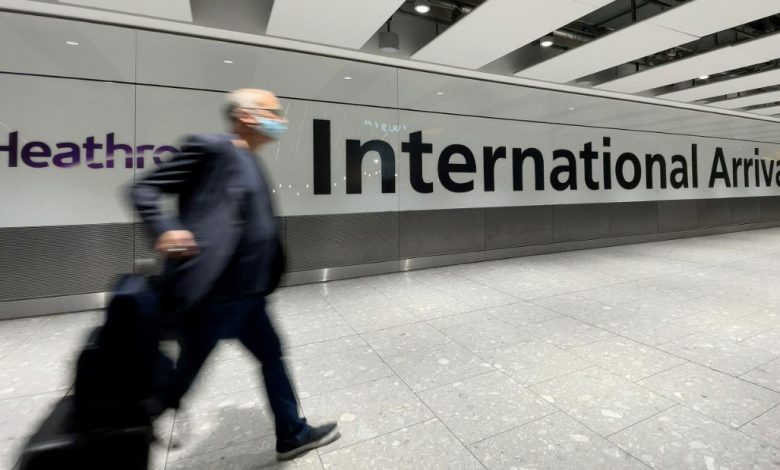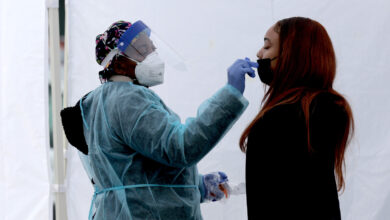Omicron, a new Covid-19 variant with a high mutation count, causes travel bans and worries scientists

It appears to be spreading rapidly in parts of South Africa, and scientists fear its unusually high mutation count could make it more contagious and lead to immune evasion.
The WHO Technical Advisory Organization on the Evolution of the SARS-CoV-2 Virus (TAG-VE), an independent group of experts, met on Friday to discuss the variant, a WHO statement said. know.
The advisors recommended that WHO designate the variant as “concern”, referring to the variant’s large number of mutations, its potential for increased risk of reinfection, and other evidence.
Several studies are underway and WHO will update Member States and the public as needed, the WHO statement said.
WHO urges countries to step up surveillance and sequencing efforts to better understand coronavirus variants.
Joe Phaahla, South Africa’s Minister of Health, said: “It looked like some sort of outbreak at first, but from yesterday scientists from our Genomic Surveillance Network showed they were doing it. observed a new variant”. It is not clear where the variant first appeared.
South African officials initially said there was one confirmed case of a traveler from South Africa to Hong Kong. Subsequently, Hong Kong health authorities on Friday identified a second case of variant B.1.1.529 among returning travelers on the same floor of a designated quarantined hotel.
Also on Friday, the Belgian government said a new individual who had arrived from abroad and was unvaccinated had tested positive for the new variant, marking the first case in Europe.
Tulio de Oliveira, director of South Africa’s Center for Disease Response and Innovation, said the variant had “more mutations than we expected”, adding that “it is” spreading very quickly and We expect to see pressure on the health system over the next few days and weeks. ”
Viruses, including the virus that causes Covid-19, mutate frequently, and most new mutations do not have a significant impact on virus behavior and the diseases they cause.
Ashish Jha, dean of Brown University’s School of Public Health, told CNN that this variant “works differently,” and that it “seems to be much more contagious than the Delta variant.”
Following advice from US health officials, US President Joe Biden will limit travel from South Africa, Botswana, Zimbabwe, Namibia, Lesotho, Eswatini, Mozambique and Malawi, administration officials told CNN.
This does not apply to US citizens and lawful permanent residents. As with all international travelers, they must still test negative before traveling.
What we know about the new variant
Lawrence Young, a virologist and a professor of molecular oncology at Warwick Medical School in the United Kingdom, said the Omicron variant was “very disturbing.”
“This is the most heavily mutated version of the virus we’ve seen to date. This variant carries some changes that we’ve seen before in other variants but never in the same category. virus. It also has new mutations,” Young said in a statement.
Neil Ferguson, director of the MRC’s Center for Global Infectious Disease Analysis at Imperial College London, said in a statement the number of mutations in the spike protein was “unprecedented”.
“The protein gene spike [is] Protein is the target of most vaccines. There is therefore a concern that this variant may be more likely to escape pre-immunity than previous variants,” said Ferguson.
Sharon Peacock, professor of Public Health and Microbiology at the University of Cambridge, said that while the total number of Covid-19 infections was relatively low in South Africa, there had been a rapid increase in the past seven days.
She said while 273 new infections were recorded on November 16, the number rose to more than 1,200 by November 25, with more than 80% coming from Gauteng province.
“The epidemiological picture suggests that this variant may be more transmissible, and that some mutations are consistent with enhanced transmissibility,” Peacock said in a comment shared by the Center for Scientific Communication. study of the United Kingdom.
She added, while the significance of the mutations and their combinations are unknown, some of the mutations present in the latest variant have been implicated in immune avoidance in others.
Jha also said scientists were concerned about the speed at which the Omicron variant took off. “This has become dominant very quickly in South Africa, in the areas where it is found, in a matter of days to weeks instead of months,” he told CNN.
What we don’t know
Peacock, de Oliveira, Ferguson, Jha and other scientists say it’s too early to tell the full impact of mutations on vaccine effectiveness.
De Oliveira stressed that Covid-19 shots are still the best tool against the virus, adding that laboratory studies still need to be done to test vaccine and antibody avoidance.
“I don’t think we’re going to see a situation where vaccines are going to be useless,” Jha said. “I think that’s extremely unlikely. The question is, will there be a small impact on the effectiveness of the vaccine, or is there a big impact? I think we’ll probably get to it. some preliminary data over the next few days.”
More studies are also needed to understand the clinical severity of the variant compared with previous variants.
It’s also not clear where the new mutation came from. While it was first identified in South Africa, it may have come from elsewhere.
“It is important not to assume that this variant first appeared in South Africa,” says Peacock.
Vaccine maker Moderna said Friday that the combination of mutations seen in the new Omicron variant represents a “significant potential risk for accelerating the decline of innate and vaccine-induced immunity”. Please cause.”
The company said it is working quickly to test the ability to neutralize the new variant of the vaccine and expects data to be available in the coming weeks.
AstraZeneca, another vaccine maker, said it is investigating the impact of the Omicron variant on a coronavirus vaccine and is testing an antibody combination therapy against the new variant.
A company spokesperson said the platform used in the vaccine allows the company to respond quickly to new variants.
“AstraZeneca is also conducting research in locations where the variant has been identified, namely in Botswana and Eswatini, which will allow us to collect actual Vaxzevria data,” the spokesperson said. against this new virus variant”.
AstraZeneca’s vaccine is not currently approved for use in the United States.
Rapid response
Scientists have praised South African health authorities for their swift response to the Covid-19 outbreak in the country’s Gauteng province, which led to the discovery of the new variant.
As cases in the province began to increase at a higher rate than elsewhere, health professionals focused on sequencing samples from people who tested positive, which allowed them to quickly identify identified variant B.1.1.529.
Peacock said South Africa’s Department of Health and its scientists “will be applauded for their response, their science and in sounding the alarm to the world.”
She added that the development demonstrates the importance of having excellent sequencing capabilities and sharing expertise with others.
The response to the announcement of the new variant discovered by South African health authorities was also swift.
UK officials on Thursday announced six African countries would be added to Britain’s travel “red list” after the UK Health Security Agency flagged concern about the variant.
UK Health Secretary Sajid Javid said flights to the UK from South Africa, Namibia, Lesotho, Botswana, Eswatini and Zimbabwe will be suspended from Friday noon and all six countries will be added to the list. red list – means UK residents and UK and Irish nationals returning home from those points of departure must undergo a 10-day hotel quarantine at their own expense.
Speaking on Friday, Javid said it was “very likely” that variant B.1.1.529 has spread beyond southern Africa. In a statement to the UK House of Commons on Friday, Javid expressed concern that it could “pose a significant risk to public health.”
European Union countries have agreed to introduce temporary restrictions on all travel into the EU from southern Africa for the new Covid-19 variant, the bloc said on Friday.
EU Commission spokesman Eric Mamer said: “Member states agreed to “introduce swift restrictions on all travel into the EU from seven countries in the South African region: Botswana, Eswatini, Lesotho”. , Mozambique, Namibia, South Africa, Zimbabwe”.
Singapore, Japan, Malaysia, Philippines, Israel, Turkey, Egypt, Dubai, Saudi Arabia, Bahrain and Jordan have also announced new restrictions on visitors from the region.
Health Minister Jean-Yves Duclos said Canada will “ban the entry of foreign nationals … who have traveled through southern Africa in the past 14 days” due to the new coronavirus variant, Health Minister Jean- Yves Duclos said at a press conference on Friday.
“Canadians and permanent residents and those with the right to enter Canada will be screened on arrival, [and] They will be isolated until they receive a negative test result,” according to Duclos.
South Africa has fully immunized 35.37% of its adult population and has seen the proportion of people starting vaccinations drop in recent days, according to data from the country’s Ministry of Health.
CNN’s Jacqueline Howard, Kaitlan Collins, John Bonifield, Steve Almasy, Duarte Mendonca, Niamh Kennedy, Mia Alberti, Andrew Carey, Amir Tal, Antonia Mortensen, Tim Lister, Nadine Schmidt, Virginia Langmaid and Melissa Alonso contributed reporting.
.




